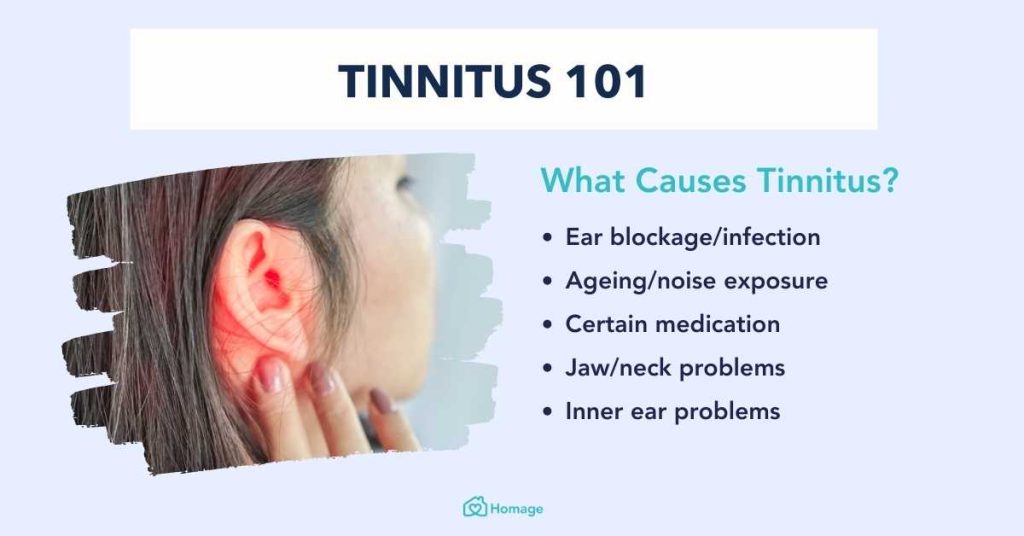Tinnitus is not a condition itself but a symptom of an underlying health issue, such as hearing loss, ear injury, or circulatory system disorder. Understanding this condition will help you identify and treat it promptly.
So, what are the causes of tinnitus and how can you detect it early? Let’s delve into this topic in this article!
What is Tinnitus?
Tinnitus is a condition characterized by the presence of an unusual noise in the ears. It is a symptom of an underlying health issue.
This noise is only audible to the affected individual, often resembling a ringing sound. While tinnitus can be bothersome, it is typically not associated with serious issues.
In less than 1% of cases, people around the affected individual may hear the noise in their ears. This type of ear noise may be caused by cardiac (pulsatile tinnitus) or musculoskeletal movements. This could be a sign of a health condition that requires immediate treatment.
Click here to view Tinnitus Treatment
What are the Symptoms of Tinnitus?
The noise in the ears can be continuous or intermittent in one or both ears. The pitch of the sound can be low or high.
Additionally, the noise may come in various forms, such as ringing, buzzing, or pulsing.
Individuals with tinnitus often perceive the noise most prominently at night or in quiet environments. In some cases, they may experience hearing loss.
When Should You See a Doctor?
If the noise in your ears is causing discomfort, occurs after upper respiratory tract infections, such as colds, or doesn’t improve within a week, you should see a doctor.
Furthermore, you should see a doctor as soon as possible if:
- The noise in your ears appears suddenly or without an apparent cause.
- You experience hearing loss or dizziness.
What Causes Tinnitus?
Several health conditions can cause or worsen tinnitus. In many cases, doctors cannot pinpoint the exact cause of this phenomenon.
A common cause of tinnitus is damage to the inner ear hair cells. These delicate, thin hairs in the inner ear move in response to sound waves. This activates cells that release electrical signals through the auditory nerve to the brain. The brain interprets these signals as sound. If the hairs in the inner ear are bent or broken, they may leak random electrical impulses to the brain, causing noise.
Other causes of tinnitus include ear issues, chronic health conditions, and ear or head injuries, affecting the nerves in the ear or the auditory centers in the brain.
Common Causes of Tinnitus In many people, the noise in the ears is caused by:
- Aging: For many, hearing diminishes with age, often starting around age 60. Hearing loss can lead to tinnitus.
- Exposure to loud noises: Loud noises, such as machinery sounds, are common causes of noise-induced hearing loss. Personal listening devices, like music players, can also cause noise-induced hearing loss if used for prolonged periods. Tinnitus due to exposure to loud noises in the short or long term often disappears after a while. However, exposure to loud noises for short or extended periods can cause permanent ear damage.
- Earwax: Earwax protects the ear canal by trapping external dirt and slowing the growth of bacteria. However, when too much earwax accumulates, it can cause hearing loss or irritate the eardrum, causing tinnitus.
- Changes in ear bone: Conditions such as otosclerosis can affect hearing and cause tinnitus. This condition results from abnormal bone growth in the middle ear and is hereditary. Other Causes Less common causes of tinnitus include:
- Meniere’s disease: Tinnitus can be an early sign of Meniere’s disease, a disorder of the inner ear that may result from abnormal inner ear fluid pressure.
- Temporomandibular joint disorder (TMJ): TMJ disorders can cause tinnitus.
- Head or neck injury: Head or neck trauma can affect the inner ear, the auditory nerve, or the brain’s hearing centers. Such injuries typically cause tinnitus in one ear only.
- Acoustic neuroma: This benign (non-cancerous) tumor develops on the cranial nerve running from the brain to the inner ear and controls balance and hearing. This condition can cause tinnitus in one ear.
- Eustachian tube dysfunction: In this condition, the Eustachian tube, which connects the middle ear to the back of the throat, fails to close as it should, causing a feeling of fullness in the ear. Eustachian tube dysfunction may be caused by excessive weight loss or radiation therapy.
- Tensor tympani muscle spasms: The tensor tympani muscle may tense up (spasm), causing tinnitus, decreased hearing, and a feeling of fullness in the ear. This sometimes occurs without an obvious reason but may also be caused by neurological diseases, including multiple sclerosis.

- Click here to view Tinnitus Treatment
Abnormal Blood Vessel Disorders Related to Tinnitus In a few cases, tinnitus is due to vascular disorders. This type of tinnitus is pulsatile. Causes include:
- Atherosclerosis: Accumulation of cholesterol and other substances in large blood vessels near the middle and inner ear can make them less elastic. This makes the heart work harder to pump blood through the hardened vessels, resulting in a rhythmic noise in both ears.
- Tumors in the head and neck: A tumor pressing on the blood vessels in the head or neck (vascular tumors) can cause tinnitus and other symptoms.
- High blood pressure: High blood pressure and factors that increase blood pressure, such as stress, alcohol, and caffeine, can make tinnitus more noticeable.
- Abnormal blood flow: Narrowing or turbulence of the carotid artery (carotid artery) or jugular vein can disrupt blood flow to the ears.
Other Causes Some medications can cause or worsen tinnitus. Typically, the higher the dose of these medications, the worse the tinnitus. This condition disappears when you stop taking these medications:
- Antibiotics, including polymyxin B, erythromycin, vancomycin, and neomycin
- Cancer treatment drugs methotrexate and cisplatin
- Diuretics, such as bumetanide, ethacrynic acid, or furosemide
- Quinine used for malaria or other health conditions
- Some antidepressants
- High-dose aspirin
Who Is Prone to Tinnitus?
Anyone can experience tinnitus, but certain factors may increase your risk, such as:
- Exposure to loud noises: Prolonged exposure to loud noises can damage the tiny sensory hair cells in your inner ear, which transmit sound to your brain.
- Aging: As you age, the number of active nerve fibers in your ear decreases, leading to potential hearing problems.
- Gender: Men are more likely to experience tinnitus than women.
- Smoking: Smokers are at a higher risk of developing tinnitus.
- Cardiovascular issues: Conditions that affect blood flow, such as high blood pressure or narrowed arteries (atherosclerosis), can increase the risk of tinnitus.
Is Tinnitus Dangerous? This condition significantly affects the quality of life. Tinnitus can lead to:
- Fatigue
- Stress
- Sleep problems
- Memory issues
- Depression
- Anxiety and irritability Although treating these health conditions doesn’t cure tinnitus, it can help reduce the noise.
Diagnosis and Treatment Diagnosing Tinnitus A doctor will examine your ears and conduct hearing tests to diagnose tinnitus.
You may also need imaging tests, such as CT or MRI scans, to see if you have any ear defects or injuries. X-rays typically do not show tumors, blood vessel disorders, or other abnormalities that may affect hearing.
Treatment Options for Tinnitus
Treating Underlying Health Conditions To treat tinnitus, your doctor will first try to identify any underlying health conditions or related treatments. If health issues are the cause, the doctor may take the following steps to reduce the noise:
- Removing earwax
- Treating blood vessel issues: Depending on your vascular health, treatment may involve medication, surgery, or other interventions.
- Changing medications: If the cause of tinnitus is medication-related, your doctor may advise you to stop or reduce the medication dosage or switch to a different medication. In some cases, white noise can help patients forget about the noise in their ears. Medications Medications cannot cure tinnitus, but in some cases, they can help reduce the severity of symptoms or complications. These medications may include:
- Tricyclic antidepressants, such as amitriptyline and nortriptyline. However, these medications are typically only used for severe cases because they can cause side effects such as dry mouth, blurred vision, constipation, and heart issues.
- Alprazolam may help reduce tinnitus symptoms, but side effects may include drowsiness and nausea. It can also be habit-forming.
Click here to view Tinnitus Treatment
Lifestyle Changes Some at-home remedies can help you manage tinnitus, such as:
- Avoiding stimulants, such as nicotine or caffeine, and loud noises
- Managing stress by practicing relaxation therapies, such as yoga or meditation
- Limiting alcohol consumption Other Alternative Methods Acupuncture Using Ginkgo biloba Taking zinc and vitamin B supplements Prevention Preventing Tinnitus In some cases, you may not be able to prevent this condition. However, for many cases, you can prevent ear noise by:
- Wearing hearing protection when exposed to loud noises
- Listening to music or using earphones at a moderate volume
- Maintaining cardiovascular health by exercising regularly and eating a healthy diet.

